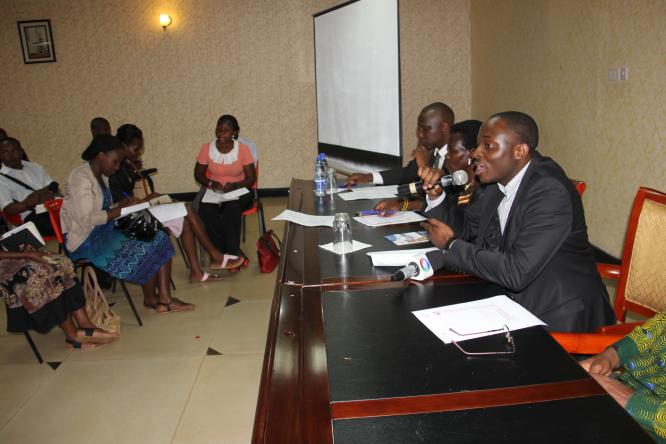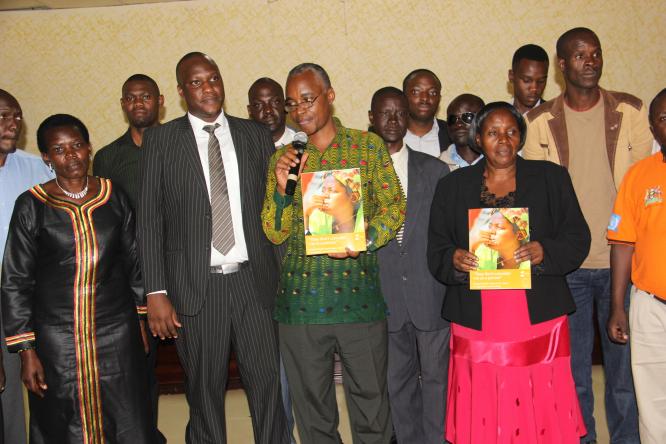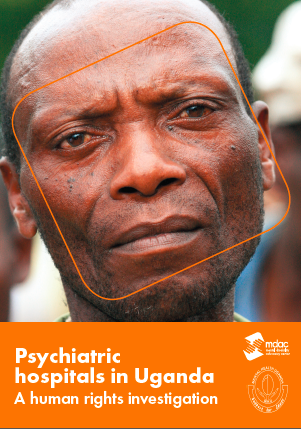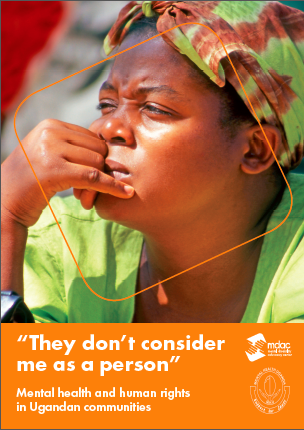Torture and ill-treatment endemic in Ugandan psychiatric hospitals and communities
“They would tie me and the ropes even entered the flesh, beat me before giving me medicine, because there was some medicine I used to bath with but it would itch and I felt my body was burning.”
Man with mental health issues, referring to his experience in a traditional healing setting
Based on extensive human rights monitoring since last year, MDAC and MHU jointly published two reports examining abuses in nine psychiatric hospitals in the country, and examining ill-treatment in community settings. The launch was attended by representatives of the Ugandan government, the Office of the UN High Commissioner for Human Rights, civil society and people with mental health issues themselves.
 Launch of the two reports, Kampala, 11 December 2014. (c) MDAC.
Launch of the two reports, Kampala, 11 December 2014. (c) MDAC.
Psychiatric Hospitals in Uganda: A human rights investigation, exposes the systematic and unregulated practice of secluding people in bare, concrete cells in psychiatric hospitals, often for days on end and without any observation. Monitors at Butabika hospital, the country’s only specialist psychiatric hospital, found wards of 150 people with just three nurses, high rates of violence, and practices including the shaving of women’s body hair by male staff. The practices are odds with basic legal standards including the right to freedom from torture, ill-treatment and exploitation.
Martin Babu, Ugandan member of the United Nations Committee on the Rights of Persons with Disabilities spoke at the launch event. He said: “As in most African communities, mental health is understood as an issue of the family rather than a communal or national issue. This approach is misguided because the magnitude appears to be high. Over 60 percent of the population in Northern Uganda is affected by mental health problems. The biggest problem is that most African governments allocate less than 2 percent of their budgets to mental health.”
“Almost all seclusion takes place naked. While long periods can be spent in the seclusion room, when the room is being cleaned, the patient will be asked to go out into the courtyard, still naked.”
Young male patient at Butabika hospital
The second report launched today was based on research conducted by people with mental health issues themselves with their peers around the country. "They don’t consider me as a person": Mental health and human rights in Ugandan communities documents interviews with 40 people with mental health issues and their relatives. The research, which was led by people with mental health issues, exposed violence, exploitation and abuse in the lives of many. Suspicion, superstition and the lack of community-based supports resulted in many reporting abuse at the hands of community members, traditional healers and the police.
To read the reports, click below.
Commenting on the publication of the community report, the Hon. Jovah Kamateeka, Chair of Uganda’s Parliamentary Committee for Human Rights said: “As Ugandans, we have a moral and legal obligation to take swift, targeted action and put a stop to these gross and systematic human rights violations.”
Madam Beatrice Kaggya, Commissioner for Disability at the Ugandan Ministry of Gender, Labour and Social Development received the reports on behalf of the Ugandan government, commending MDAC and MHU for "producing these important human rights reports."
Uganda voluntarily ratified the United Nations Convention on the Rights of Persons with Disabilities (UN CRPD) in 2008. The Convention guarantees human rights protections to all people with disabilities in the country, including those with mental health issues. However MHU and MDAC found that the country has not yet set up a monitoring body to ensure implementation of the Convention, meaning that psychiatric hospitals operate with virtually no independent scrutiny. Pharmacology and coercion were found to dominate mental health provision in the country, and there has been little progress in establishing community-based support.
Derrick Kizza, Executive Director of Mental Health Uganda said that the abuses stemmed from a failure to roll-out community based services: “It is important to invest significant resources in community mental health services because it will ease access to quality care for people with mental health issues. It will also reduce the numbers of people placed into psychiatric hospitals, and given the scarcity of human resources in our country.”
 Beatrice Kaggya, Commissioner for Disability, formally launches the reports. (c) MDAC.
Beatrice Kaggya, Commissioner for Disability, formally launches the reports. (c) MDAC.
MDAC and MHU called for the Ugandan government to take decisive action to tackle the abuses uncovered, and ensure that systemic reforms are placed high on the government’s agenda. “The shocking abuses we have uncovered show a failure to tackle serious human rights violations against tens of thousands of Ugandans with mental health issues,” said Oliver Lewis, MDAC’s Executive Director. “MDAC urges the Ugandan government to end abuses immediately, and put in place a robust independent system to monitor compliance with international human rights law.”
Please support us so that we can continue challenging human rights violations.
Donate to our seasonal appeal



